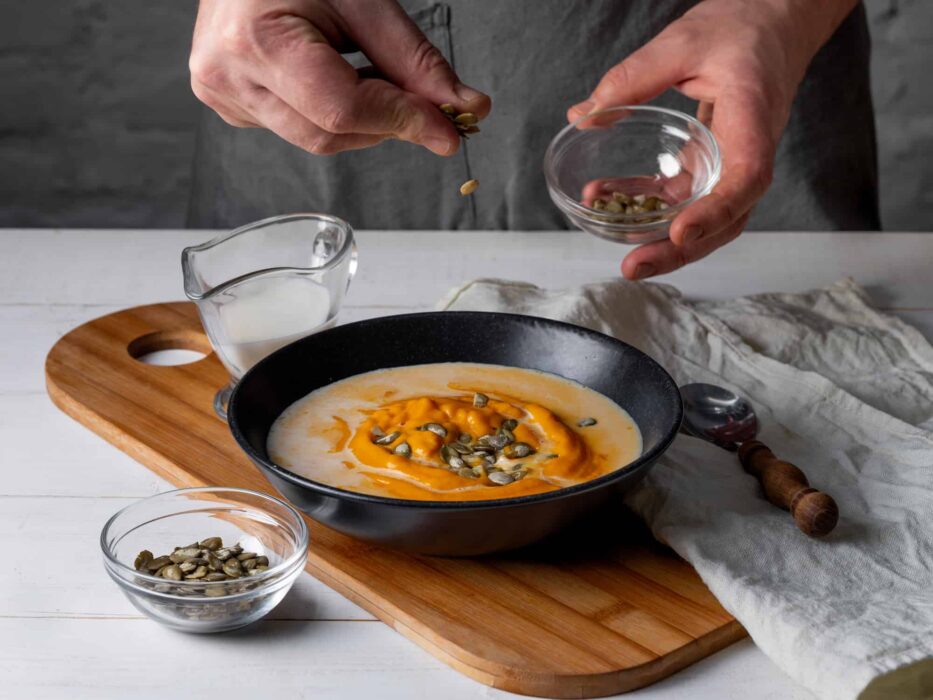If you follow the keto diet, then you already know that it prohibits all carbs, except for vegetables that grow above ground. However, while all leafy green vegetables are allowed in any quantity on a low-carb diet, other colorful vegetables are questionable.
For example, tomatoes and bell peppers are keto but contain more carbs than greens. Therefore, you should limit their amount if you want to stay in ketosis. And what about pumpkin? Is pumpkin keto?
Yes, pumpkin is keto-friendly and won’t hurt your ketosis if you stick to it in moderation. This vegetable contains a small number of carbs, some of which are starchy. You should add pumpkin to your keto meal plan to get all of its health benefits.

How many carbs are in pumpkin? What amount of pumpkin can you eat on keto? Are pumpkin seeds keto? What benefits does pumpkin have for your health? I have answers to all your questions. Let’s look at them in detail!
Is Pumpkin Keto?
Pumpkin is often controversial in the keto world due to its carb content. However, is it true that it contains too many starchy carbs? Let’s figure it out!
Is Avocado Keto? 9 Reasons to Add It to Your Diet
100 grams of pumpkin contain (depending on the variety):
- 26 calories
- 1 gram of protein
- 1 grams of fat
- 9 grams of carbohydrates
- 4 grams of fiber
- 5 grams of net carbs.
As you can see, pumpkin is keto in moderation. You can make pumpkin keto soup, pumpkin pie, or bake pumpkin keto bread and enjoy a variety of high-fiber meals. However, remember that you should not eat more than 20 grams of carbs per day. Therefore, consider the amount of pumpkin and monitor your ketosis.
Benefits of Pumpkin for Your Health
In addition to being a delicious keto-friendly vegetable, pumpkin also has many benefits for your health [1]. Let’s look at them in detail.
Supports a Healthy Digestive System
Pumpkin contributes to the normalization of the gastrointestinal tract. It is well absorbed by the body and, at the same time, removes harmful substances from it. Also, this vegetable helps with both diarrhea and constipation due to its high fiber content. Therefore, adding pumpkin to your diet can significantly improve the functioning of the stomach and intestines during keto, just like any other meal plan.
Improves Metabolism
Since pumpkin is very well absorbed and contains a large amount of vitamin K, its use helps to improve metabolism. Thanks to this, toxins are removed from the body, and excess weight is also reduced. That is why pumpkin is often included in all diets, including sports ones. Another important property is that pumpkin does not cause allergic reactions and other side effects, so almost everyone can consume it.
Supports the Circulatory System
Pumpkin contains many elements that have a beneficial effect on the blood formation process. These are phosphorus, copper, and, in particular, iron [2]. A sufficient amount of these substances is the key to high hemoglobin, and this, in turn, helps maintain the health of the circulatory system and overall well-being. In addition, pumpkin improves blood circulation, reducing the risk of blood clots.
Strengthening the Immune System
Pumpkin contains a large number of various vitamins that contribute to the body’s resistance to external triggers. These are vitamins B, C, PP, and the rare one -vitamin K.
Pumpkin contains a complex of elements that regulates the healthy metabolism of fats, proteins, and carbohydrates. In addition, this vegetable has many trace elements (zinc, phosphorus, magnesium, iron, copper), proteins, carotene, pectins, and fiber. These substances, as well as antioxidants, strengthen the immune system of your body. Therefore, eating pumpkins before the cold season is especially important as it can help resist respiratory infections.

Supports Skin Health
You may be surprised to learn that pumpkin is often used as an ingredient in skin therapy. It promotes skin health, hydration, and cleansing. Equally important is the use of pumpkin as part of your diet, as its rich composition includes antioxidants [3]. They prevent premature cell aging and keep the skin healthy.
Reduces the Risk of Heart Disease
Pumpkin has a lot of potassium, and it has a good effect on the work of the heart. It also reduces swelling, and this, in turn, supports the heart and improves vascular patency.
Keto Diet: All the Healthy Keto Tips for Women over 50
Pumpkin also helps lower blood cholesterol levels. It is very important since its excess is the main cause of heart attacks and other dangerous diseases of the cardiovascular system.
Supports Sexual Health
You must be surprised to learn that pumpkin is a natural aphrodisiac, equally powerful for men and women. At the same time, it not only stimulates sexual desire but also improves the health of the reproductive system [4]. By the way, pumpkin seeds are the most useful from this point of view, although the pulp also contains many necessary substances.
Are Pumpkin Seeds Keto?
If pumpkin is keto, then what about pumpkin seeds? Can you add them to your keto diet without hurting your keto weight loss?
100 grams of pumpkin seeds contain:
- 446 calories
- 19 grams of protein
- 19 grams of fat
- 54 grams of carbohydrates
- 19 grams of fiber
- 35 grams of net carbs.
So, are pumpkin seeds keto? At first glance, pumpkin seeds contain too many carbs. However, 100 grams is a very large amount, and in fact, ¼ cup of seeds contains about 5 net carbs. It won’t hurt your ketosis, so you can safely use pumpkin seeds as an addition to various meals or as part of a healthy keto snack.
Pumpkin seeds have many benefits for your health. Almost half of them are oils. The high content of essential fatty acids has a beneficial effect on the cardiovascular system, preventing the development of atherosclerosis [5].
Pumpkin seeds are rich in vitamins A, B, C, E, and K. All of them are vital for your health. For example, vitamin K is involved in the process of hematopoiesis, and vitamins A and E are responsible for prolonging youth and have antioxidant properties. In addition, pumpkin seeds are high in phosphorus, which is needed for strong bones and nerves.
100 grams of seeds contain half of the daily intake of zinc, which positively affects the nervous and immune systems, regulates digestion, helps produce insulin, and normalizes blood sugar levels. In addition, zinc helps to lose weight [6]. It is involved in many metabolic processes in the body, lowers bad cholesterol, and promotes your fight against excess weight.

Yummy Bonus: Keto Pumpkin Spice Latte
A gentle combination of cream, coffee, and delicate pumpkin is like a soft hug on a cold evening. Or a delicious keto dessert that fills you up and gives you a combination of healthy fats with minimal carbs. In general, this option is bulletproof coffee with a few changes.
Ingredients:
- coffee – 200 ml
- coconut milk – 100 ml
- pumpkin – 30 gr
- ground ginger
- cinnamon
- ground nutmeg
- vanilla extract
- ground black pepper
- allspice
- around cloves
- heavy whipped cream – 2 tbsp
- butter – 2 tsp
- sweetener – to your taste
Preparation:
Boil or bake pumpkin slices until soft. Place a small saucepan over low heat and pour the coconut or almond milk (sometimes, I use heavy cream or coconut cream for a smoother texture). Heat the mixture a little bit. Then add butter, pumpkin pieces, and spices to your taste.
You can find most of the spices in the pumpkin pie blend. In this case, you only have to add cinnamon and vanilla extract to your taste. Then, use an immersion blender to beat all ingredients until smooth.
All the Truth about Keto-friendly Fruits
Brew strong black coffee and add it to the saucepan. Heat the mixture slightly until it comes to a boil. Add sweetener if desired. It can be liquid stevia or erythritol. Thoroughly mix your latte and pour it into cups. Top with whipped cream and add spices as desired. Enjoy!
This keto pumpkin latte recipe contains:
- 143 calories
- 1 gram of protein
- 21 grams of fat
- 5 grams of carbohydrates
- 2 grams of fiber
- 3 grams of net carbs.
Conclusion
Due to its low-calorie content, pumpkin is an excellent dietary vegetable. It contains a small amount of starch, no cholesterol, and no trans fats. It also has a few carbs but a lot of fiber useful for digestion. Pumpkin is keto-friendly and can be a great addition to your keto diet plan. This is a versatile vegetable that can be used for making soups, pies, purees and served as a side dish for meat and fish. Pumpkin is also an ingredient in many delicious keto desserts.
Try adding it to your keto menu and enjoy a healthy low-carb lifestyle!
Sources:
- Yadav M, Jain S, Tomar R, Prasad GB, Yadav H. Medicinal and biological potential of pumpkin: an updated review. Nutr Res Rev. 2010 Dec;23(2):184-90. doi: 10.1017/S0954422410000107. PMID: 21110905.
- Amin, M. Z., Islam, T., Uddin, M. R., Uddin, M. J., Rahman, M. M., & Satter, M. A. (2019). Comparative study on nutrient contents in the different parts of indigenous and hybrid varieties of pumpkin (Cucurbita maximaLinn.). Heliyon, 5(9), e02462. https://doi.org/10.1016/j.heliyon.2019.e02462
- Balgoon, M. J., Al-Zahrani, M. H., Jaouni, S. A., & Ayuob, N. (2021). Combined Oral and Topical Application of Pumpkin (Cucurbita pepo) Alleviates Contact Dermatitis Associated With Depression Through Downregulation Pro-Inflammatory Cytokines. Frontiers in pharmacology, 12, 663417. https://doi.org/10.3389/fphar.2021.663417
- Akomolafe SF, Olasehinde TA, Aluko BT. Diets supplemented with raw and roasted pumpkin (Cucurbita pepo L) seeds improved some biochemical parameters associated with erectile function in rats. J Food Biochem. 2021 Feb;45(2):e13629. doi: 10.1111/jfbc.13629. Epub 2021 Jan 27. PMID: 33502019.
- Montesano, D., Blasi, F., Simonetti, M. S., Santini, A., & Cossignani, L. (2018). Chemical and Nutritional Characterization of Seed Oil from Cucurbita maxima L. (var. Berrettina) Pumpkin. Foods (Basel, Switzerland), 7(3), 30. https://doi.org/10.3390/foods7030030
- Khorsandi, H., Nikpayam, O., Yousefi, R., Parandoosh, M., Hosseinzadeh, N., Saidpour, A., & Ghorbani, A. (2019). Zinc supplementation improves body weight management, inflammatory biomarkers and insulin resistance in individuals with obesity: a randomized, placebo-controlled, double-blind trial. Diabetology & metabolic syndrome, 11, 101. https://doi.org/10.1186/s13098-019-0497-8
